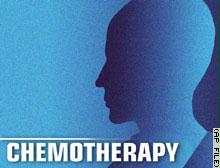
Late this afternoon, Claire and I come to Dr. Lerner’s office to speak with him about chemotherapy. This coming Tuesday I'm going to the hospital to get the porta-cath put in, and Wednesday I get my first chemo treatment. So now’s the time to find out what’s ahead.
I learn more about chemotherapy than I ever expected to know. We have our list of questions, and Dr. Lerner patiently answers each one. He tries to be reassuring – and he is, by and large – but there’s no denying the fact that this is very strong medicine indeed. We learn even more from Vanessa, one of the chemotherapy nurses, who tours us through the part of the office where they administer the drugs, then loads us down with page after page of fact sheets about each medication I’ll be receiving.
We’re all used to reading those prescription ads in magazines – the ones with the photos of happy people that list, in tiny print, all the side effects that could make those people unhappy. We feel a little like that after leaving Dr. Lerner’s office. We’ve just read the small print.
The possible side effects are legion. Some are not just possible, it turns out. They’re inevitable. Like hair loss. Dr. Lerner’s very blunt: "You will lose your hair." (Three of the four medicines that comprise the CHOP chemo cocktail list hair loss as a likely side effect, so I’ve been figuring all along it’s pretty hard to dodge all those bullets.) Vanessa later tells us this isn’t just head hair: it’s body hair, facial hair, eyebrows and eyelashes. A few patients keep some of their body hair (like the woman Vanessa tells us about, who was looking forward to not having to shave her legs, but her leg hair turned out to be the only hair she kept). But most lose it all.
I can handle the hair loss, I think to myself. Sure, it will be emotionally wrenching the first time I hold a comb-full of hair in my hand, but right now it feels like it’s something I’m prepared for. Yesterday I went to the barber for a haircut, and worked it all out with him: as soon as the hair starts to go, I’ll come in and get a Marine Corps special. Most patients, it seems, choose to get their head shaved, rather than waiting for all the hair to fall out in clumps.

Then there’s nausea. Thankfully, the news seems to be a good bit better on that subject than I’ve heard in the past. Dr. Lerner tells me they now administer a powerful anti-nausea drug along with the chemotherapy infusion. It works for most people. Just in case it doesn’t, he hands me a prescription for another anti-nausea drug, which I can keep at home and use as needed.
He also gives me a prescription for something called allopurinol, which I’m to take after receiving the chemo. If I don’t, uric acid may build up in my body, and I could come down with gout.
Fatigue is another big issue. Everybody who gets chemo, it seems, complains about fatigue to one degree or another. These drugs take a lot out of you.
Just to make things more interesting, prednisone – a steroid that accounts for the "P" in the CHOP acronym – can cause agitation and sleeplessness. So I suppose it ends up being like drinking a pot of Irish Coffee: uppers and downers at the same time. Are we having fun yet?
Dr. Lerner says that some people take prednisone and immediately experience a burst of energy, cleaning the house from top to bottom. Claire remarks that she wouldn’t mind if I got that side effect. No, I don’t suppose you would, I chuckle to myself.
Prednisone also results in puffiness and swelling, particularly around the cheeks. It results in the distinctive chemo moon-faced look. I could always get one of those zig-zag sweaters and start calling myself "Charlie Brown."
Along with the things patients feel are things they don’t immediately feel: changes in blood chemistry. Of the three principal types of blood cells – white, red and platelets – the CHOP chemo combination can (and typically does) eventually depress the numbers of them all. That can result in suceptibility to infections (low white cells), anemia (low red cells) and bleeding (low platelets). I’ll be coming in for weekly blood tests, so they can monitor what’s happening with my blood count, and respond appropriately with other powerful medications that can boost blood-cell production. During some of those low-immunity times, I may need to stay away from crowds – such as a Sunday-morning congregation.
One of my greatest concerns has to do with planning: will I be able to predict the down-times in advance, so I can arrange my church responsibilities accordingly? Dr. Lerner offers a few suggestions, but there are no real certainties. The side effects hit most people pretty hard, he says, but they’re able to maintain normal functioning for the most part. A small minority are so heavily affected that they can do little but stay in bed. Another small minority are hardly affected at all.
I ask about Sundays. Since those days are the focus of the most public part of my work, is there any way to predict which Sundays will be the most difficult? No, there isn’t, absolutely – although it’s likely the worst Sunday of each three-week cycle will be not the first one after my chemo infusion, but the second.
 Well, that’s something. But this whole thing is still frustratingly unspecific. There are so many variations in patient response, it seems, that no one can predict exactly how I’ll handle it. This thing is going to force me – a person who lives doggedly by the calendar – to wake up each morning, ask myself how I’m feeling, and decide then and there how I’m going to spend the hours that are given to me.
Well, that’s something. But this whole thing is still frustratingly unspecific. There are so many variations in patient response, it seems, that no one can predict exactly how I’ll handle it. This thing is going to force me – a person who lives doggedly by the calendar – to wake up each morning, ask myself how I’m feeling, and decide then and there how I’m going to spend the hours that are given to me."Let the day’s own trouble be sufficient for the day" (Matthew 6:34). Jesus tried to teach it to me, but most of the time I’ve been too thick to get the message. Chemo may be the teacher that finally succeeds.
2 comments:
I will add you to my prayers tonight. I was engaged to a man that went through the same treatments. He made it through the treatments.
I needed a reality check and I will think more about others than myself again. I know god will be with you no matter what path he leads you down.
You are teaching us about much more than cancer. You are showing us how to face adversity with dignity, grace and courage and for that I thank you. My thoughts and prayers will be with you this coming week as you get your first chemotherapy treatment. I pray the Lord will wrap His arms around you and keep you safe. JP
Post a Comment